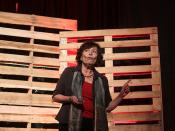It is not so much the existence of departments and fields such as "English," "African American," "Women's Studies," and "Queer Theory" that is so much at issue as the type of scholarly practice predominating under these rubrics. A more judicious practice would reform epistemological paradigms, rather than more incidental administrative ones, highlight the fact that identities and identity studies do not exclusively concern fixed and particular social groups, and reveal a more elusive cultural logic that is deeply invested in making various groups visible and divisible in the first place. What set of routine principles underwrite such intuitive partitionings? Given this line of reasoning, it would make little sense, for example, that the agenda of "Women's Studies" would entail only investigations of those gendered female, or that "African American Studies" would attend only to the "experiences" of those understood as black. These fields must also explore those cultural imperatives defining these designations, as well as ascribing and maintaining their peculiar social valences.
This is not to say that exactly this type of work is not already being done by a great number of critics beyond those illustrative few mentioned here, but it is to say that this type of work is not yet understood as definitive to the intellectual fields in question. It is not yet commonly understood as work essential to the knowledges these disciplines hope to groom and disseminate." Lindon Barrett, "Identities and Identity Studies:" Reading Toni Cade Bambara's "The Hammer Man" in Cultural Critique 39 "Traditions and the canons that confirm them are made not born, constructed not spawned. . . . the African American literary canon is an exclusive club whose roster is determined by the tastes of a handful of intellectuals."


